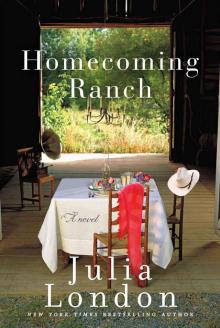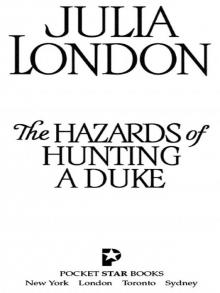- Home
- Julia London
The Perils of Pursuing a Prince
The Perils of Pursuing a Prince Read online
“Unhand me!” Greer breathed angrily.
The prince made no move to do so.
“You are the worst of scoundrels!”
“And how many scoundrels have you known?” he asked, his voice caressing and low.
Greer’s breathing quickened. “How dare you speak to me in such an ungentlemanly manner.”
“What irks you? Do you find the question offensive…or merely too personal?”
She gasped and tried to jerk her hand from his, but he held her firm. He lifted his free hand and carefully touched two fingers to her lips. Completely drawn in by a powerful craving, she parted her lips, and drew the tip of his finger into her mouth, caressing it with her tongue.
“Too personal, it would seem,” he drawled.
She bit down on his finger.
The prince only laughed. “Surely you know the best way to entice a man is to provoke him,” he murmured as he slipped his arm around her waist.
Critical acclaim for Julia London’s wonderful novels
“Heel-kickingly fun and high-spirited.”
—Publishers Weekly on Highlander in Love
“Exquisitely romantic, lusciously sensual.”
—Booklist on Highlander Unbound
ALSO BY JULIA LONDON
The Hazards of Hunting a Duke
Highlander in Love
Highlander in Disguise
Highlander Unbound
An Original Publication of POCKET BOOKS
A Pocket Star Book published by
POCKET BOOKS, a division of Simon & Schuster, Inc.
1230 Avenue of the Americas, New York, NY 10020
This book is a work of fiction. Names, characters, places and incidents are products of the author’s imagination or are used fictitiously. Any resemblance to actual events or locales or persons, living or dead, is entirely coincidental.
Copyright © 2007 by Dinah Dinwiddie
All rights reserved, including the right to reproduce this book or portions thereof in any form whatsoever.
For information address Pocket Books, 1230 Avenue of the Americas, New York, NY 10020
ISBN: 1-4165-3882-8
POCKET STAR BOOKS and colophon are registered trademarks of Simon & Schuster, Inc.
Visit us on the World Wide Web:
http://www.SimonSays.com
For Klo, Nagno, and Sanman.
I could not make up better siblings than you.
Wrth gicio a brathu, mae cariad yn magu.
—a Welsh proverb
(Whilst kicking and biting, love develops.)
One
LLANMAIR
WALES, 1820
F or some inexplicable reason, the first thing that occurred to Greer Fairchild when three men—robbers, for all she knew—stopped the coach in which she and Mr. Percy were traveling was that the death of Mrs. Smithington, to whom Greer was a traveling companion, was not only tragic, but extremely inconvenient.
They had almost reached the foreboding Llanmair, having lumbered up a rutted road for the better part of an afternoon, yet the day’s gloomy light had not faded so much that Greer couldn’t distinguish the ancient gray castle from the crag on which it sat, rising high above the woods and mountains that surrounded it.
It was an imposing structure, four stories high, built with gray stone, and anchored by four turrets in each corner. They were so close to the castle! They were so close to ending Greer’s ordeal, and now this!
“Stay here,” Mr. Percy said, looking quite grim when the coach rattled and groaned to a halt at the approach of the three riders. “I shall speak with them.” He climbed out of the carriage, shut the door soundly, and strode forward to the three men who now stood between Greer and the man in the castle who held her inheritance.
“This is not to be borne,” she muttered under her breath. Not after all she’d endured in the last year. Not after her guardian aunt’s death and the endless hours she’d spent with Mrs. Smithington in public coaches with people who thought nothing of bringing their chickens and dogs along with them. Not after all the bouncing she’d endured along every pit and rut as they’d traversed empty moors, or losing sight of the sun in forests so thick with trees that no light could filter through. She’d come within a quarter of a mile of the gates to what she hoped was her final destination, only to be stopped.
It was extremely vexing.
Greer peered out the window to where Mr. Percy had confronted the three men with his legs braced wide and his arms akimbo. She groaned with exasperation and laid her head against a torn squab. She supposed she ought to feel frightened of the men, being as far from civilization as she was, but she felt nothing but exhaustion and the grime of hard travel on her body. Not to mention the disgust of having traveled three days in the same gown, for it was bloody cold in Wales and the poor gown was the warmest garment she possessed.
“Astoundingly inconvenient,” she said aloud.
Really, if Mrs. Smithington hadn’t died when and where she did, poor thing, Greer might have made this trip to Wales in the summer, when the sun was bright and warm. Not now, in late autumn, when the weather was dreadfully cold and damp. She might have reached Llanmair, where the Prince of Thieves—as she’d come to think of him—supposedly lived in half the time it had taken them over these ridiculously muddy and pitted roads.
But then poor Mrs. Smithington had lain down for a nap on the very day Greer reached her uncle’s dilapidated and long-sought estate. The elderly woman had just lain down and never awoke. It was a horrible way to die—alone, with no relatives save one distant nephew, her heir, in London. While it was true Mrs. Smithington could be entirely too vexing, Greer had developed a certain exasperated fondness for her, and would not have wished such a lonely death on her.
Mrs. Smithington’s tragic death, on top of everything else, made Greer wish she’d never come back to Wales. If it weren’t for good Mr. Percy, she surely would have turned back for London along with Mrs. Smithington’s effects. But Mr. Percy had encouraged her to continue on her journey.
The journey had begun a year ago, when Greer’s legal guardian, Aunt Cassandra, Lady Downey, had died unexpectedly. Aunt Cassandra’s second husband, Lord Downey, had no desire to support Greer or her cousins, Ava and Phoebe, and had firmly and eagerly stated he was prepared to give them to whoever asked for their hand, regardless of social standing or fortune, or their wishes in the matter.
That was intolerable enough, but as Greer was merely the ward of Lady Downey, she was at the greatest disadvantage. She had no family or fortune left with which to entice a proper suitor, even if Lord Downey were inclined to see her married well. All she had of her past was an old letter, a few minor possessions that had belonged to her mother, whom she could scarcely remember, and fragments of memories that included an elderly uncle, a distant father, and no siblings.
Desperate to keep herself and her cousins from the fate Lord Downey would condemn them to, and knowing that her father had died several years ago without siring an heir, Greer had embarked on this wretched journey to find her uncle and ask after an inheritance she wasn’t even certain existed. She had no knowledge of her father’s fortune, or if he even had one, but she thought certainly there must have been something left of the man’s life. And if there was something left, it surely would have been left to her father’s brother.
It was a fragile hope, but a hope nonetheless.
Unfortunately, the only way she could possibly afford to travel to Wales was as the companion of the ancient and constantly complaining Mrs. Smithington, who wanted to see the “wild bits of England.”
After traveling for months in the company of Mrs. Smithington, Greer had finally reached Bre
dwardine, an English village on the border of Wales, where she found her uncle’s estate shockingly dilapidated. The vague memory she held of a grand home with lush lawns and fountains was a fantasy. The house was little more than a manor, not a mansion, and there was no lawn surrounding it, just a small yard with an old pig wandering aimlessly about.
The only inhabitants of the house were an aging caretaker and his wife. Moreover, most of the rooms had been emptied of furniture long ago—there was no place to sit, no place to rest, save two rooms at the very top of the stairs, which, for reasons Greer did not want to contemplate, still boasted two old and lumpy featherbeds. And as Greer had wandered about that afternoon pondering what on earth she would do now, Mrs. Smithington had begun to complain of feeling poorly.
Greer thought nothing of it at the time. Mrs. Smithington had complained endlessly since they’d left London. They’d no sooner left the outer limits of the city when she’d begun to carp about the weather (too rainy), the condition of the roads (too rutted), and the fact that there really wasn’t very much to see once one traveled through so many miles of rolling countryside (too many trees and too far from London).
At first, Greer had found the woman’s complaining amusing in an odd sort of way, but it quickly grew tiresome, especially when Greer was the one forced to hold hatboxes or small trunks in her lap while they traveled in tight public coaches.
But then Mr. Percy had boarded their coach in Ledbury and had proceeded to compliment Mrs. Smithington’s youthful smile and claimed to be shocked by her advanced age. Dear Mr. Percy, tall and handsome with brown locks and shining hazel eyes, could have charmed the gray right from Mrs. Smithington’s head if he’d so desired.
By the time they reached Herefordshire, Mrs. Smithington had persuaded Mr. Percy to accompany them to Wales with the excuse that “in the company of a gentleman, no one will prey on two poor unmarried females.”
Greer imagined that even the most depraved of villains would be deterred by Mrs. Smithington’s constant complaining, but Mr. Percy’s attention to Mrs. Smithington had been a welcome relief for her. Not only was he exceedingly charming, he was also a very good escort. He was very solicitous of their needs.
Actually, it was in the course of Mr. Percy’s particular attention to her that Greer learned what had happened to her uncle. On occasion, when Mrs. Smithington would retire early, Greer and Mr. Percy would sit by the fire in whatever inn they happened to be residing in and chat. He would invariably compliment her—her eyes as blue as the deep sea, her hair as black as India ink. Greer found his compliments lovely, but having been out two Seasons in London, she was hardly diverted by such talk.
Eventually, he felt comfortable enough to explain how a gentleman of his obvious standing had come to be riding the public coach. As it happened, he was returning to Wales to try and reason with a ruthless relative who had stolen his rightful inheritance and cast him out of his family home, all for the crime of having an English father. It was a sinister tale, and while Mr. Percy put a very brave face on it, Greer thought his relative criminally deplorable.
The story was so deplorable that she felt compelled to likewise confess that she was looking for her paternal uncle, the last known male relative on her father’s side, who had hailed from Bredwardine. But when she mentioned her uncle’s name to Mr. Percy, a strange look came over his face. “Randolph Vaughan?” he’d repeated incredulously, and suddenly leaned forward, took Greer’s hand in his, looked at her with eyes full of sympathy, and said, “Miss Fairchild, it is my sad duty to inform you that Mr. Randolph Vaughan has…died.”
Greer gasped. “Died?”
“Kicked by a horse he was gelding. The poor man lingered for days but never recovered.”
“Oh,” Greer had said, quite at a loss upon hearing the unexpected news. “Oh my.”
“Ah, but you mustn’t fret,” Mr. Percy had said with a confident squeeze of his hand. “I know there are more of your kin in Wales.”
“More?” she’d asked, confused. “But I thought my Uncle Vaughan was the last one.”
“Of your family, perhaps. But his wife’s family was rather prominent.”
Greer had felt quite confused, and remembered asking, “If I may, sir…how do you know so much about the Vaughan family?”
“Oh, that’s quite simple, really,” he’d said with a charming smile that instantly put her at ease. “Wales is rather like a small village—Welshmen are well known to one another.”
Welshmen.
Greer turned her attention outside the carriage and saw one of the men suddenly swing off his horse and put a hand on his waist, revealing a gun. She gasped as Mr. Percy swept off his hat and pushed a hand through his thick brown hair, then replaced his hat. He did not seem to be terribly frightened of the gun.
But then again, Mr. Percy was not the sort to be easily rattled. The day Greer had found Mrs. Smithington cold and stiff in that bed on the upper floor at Bredwardine, she’d given in to despair. After the shock of finding her companion dead, Greer had realized she had very little money, was far from any semblance of proper civilization, and was no closer to having what she’d come for than when she’d left London. But Mr. Percy was instantly at her side, soothing her and helping her to decide what must be done, and thankfully, making all the proper arrangements.
And when Mrs. Smithington was buried in the church cemetery, and arrangements had been made to have her effects sent back to London, Mr. Percy had asked, “You mean to go on, don’t you?”
“Go on?” Greer had cried. “Where might I go? My companion is dead, my uncle is dead, and his estate is falling down. I have no place to go but back to London, and I’ve scarcely the money for that.”
“I shall of course escort you wherever you choose,” Mr. Percy had said at once. “I am at your service, Miss Fairchild.”
“I couldn’t possibly impose.” Nor could she possibly risk the scandal of traveling with a man who was not her kin. She was walking on precarious ground as it was with Lord Downey, and besides, Ava and Phoebe would be positively apoplectic if they knew Mrs. Smithington had died and that she was traveling with a man she scarcely knew.
But once again, Mr. Percy had been very persuasive. “It is no imposition, I assure you! I’ve no fixed schedule. Furthermore, I know of a solicitor who might be able to direct you to the person who has taken over your uncle’s affairs.” At Greer’s curious look, he said, “Your uncle has died, but you may yet be entitled to an inheritance.”
When Greer demurred, he’d said with great authority, “Here now, Miss Fairchild! You’ve come all this way on your quest. You cannot abandon it without at least speaking to the gentleman. If he has no news for you, then I shall help you catch the first coach for London. There is little harm in asking, is there?”
She couldn’t argue that point.
The solicitor, Mr. Davies, was an elderly man whose office was in a very old building with sagging wood floors. After Mr. Percy had gallantly used his kerchief to dust off a chair for her, Greer explained her situation to the diminutive man: that she suspected she was her father’s only heir, but wasn’t certain, given her estrangement from her father at an early age.
Mr. Davies said nothing as she spoke. When she finished, he donned a pair of spectacles, ran his hands through a shock of stiff gray hair, then searched through a stack of papers and binders. He finally found a large leather binder, from which he pulled a sheaf of papers. He laid them out on his crowded desk and proceeded to study them, muttering to himself while Greer sat impatiently across the desk from him, Mr. Percy standing attentively behind her.
After a time, Mr. Davies removed his spectacles and peered closely at Greer. “Indeed, you are your father’s only living heir,” he said flatly.
Greer gasped with surprise and elation; Mr. Percy put a steadying hand on her shoulder.
“Unfortunately, as no provision was made to find you, and your whereabouts were unknown, the estate of your father, Mr. Yorath Vaughan, passed to
his brother, Mr. Randolph Vaughan, who is your late uncle. Mr. Randolph Vaughan likewise had no surviving heirs, and upon his death, the whole of his estate—which included your father’s portion, naturally—was passed to the husband of his deceased wife’s deceased sister, his lordship Rhodrick Glendower.”
Greer blinked, trying to follow. Mr. Davies returned his spectacles to his face and folded his hands on top of his desk. “He is known in England, indeed in Bredwardine, as the Earl of Radnor. But not three miles from here, in Wales, he is known by another name.”
Mr. Percy’s hand tightened on Greer’s shoulder. “I beg your pardon, but you can hardly mean—”
“I do indeed, Mr. Percy!” the solicitor said grandly, obviously quite pleased with himself. “Miss Fairchild’s inheritance—if indeed it does exist—has passed along with your uncle’s estate to none other than the prince of Powys!”
“Who?” Greer asked as Mr. Percy’s hand slid away from her shoulder.
“The Prince of Powys,” Mr. Davies articulated carefully. “A hereditary title in the eyes of the English, perhaps, but in Wales, madam, he is known simply as ‘The Prince.’ He is not a man to be trifled with.”
Honestly, she didn’t care if he was the bloody king of England—he had her inheritance. “How do I find him?”
Mr. Davies slammed shut the leather binder, from which arose a cloud of dust so thick that Greer had to wave it from her face. “At Llanmair, of course, where all the princes of Powys have resided before him and shall continue to reside long after he is gone.”
“And where, precisely, is Llanmair?” she pressed.
The solicitor chuckled low, pointed at the small dingy window. “West. At the base of the Cambrians, in a wood thick with game.”
Greer squinted at the old man. He held her gaze, daring her to challenge his poetic yet impractical directions. As he seemed the intractable sort, Greer stood, fished in her reticule for a crown, and held it out to Mr. Davies. “Thank you, sir. You’ve been very helpful.”

 A Royal Kiss & Tell
A Royal Kiss & Tell You Lucky Dog
You Lucky Dog The Devil in the Saddle
The Devil in the Saddle The Trouble with Honor
The Trouble with Honor Tempting the Laird
Tempting the Laird The Secret Lover
The Secret Lover A Light at Winter’s End
A Light at Winter’s End The Charmer in Chaps
The Charmer in Chaps Homecoming Ranch
Homecoming Ranch Jack (7 Brides for 7 Soldiers Book 5)
Jack (7 Brides for 7 Soldiers Book 5) A Courtesan's Scandal
A Courtesan's Scandal Hard-Hearted Highlander--A Historical Romance Novel
Hard-Hearted Highlander--A Historical Romance Novel The Complete Novels of the Lear Sister Trilogy
The Complete Novels of the Lear Sister Trilogy The Last Debutante
The Last Debutante Suddenly Single (A Lake Haven Novel Book 4)
Suddenly Single (A Lake Haven Novel Book 4) Seduced by a Scot
Seduced by a Scot Highlander Unbound
Highlander Unbound Suddenly Dating (A Lake Haven Novel Book 2)
Suddenly Dating (A Lake Haven Novel Book 2) The Bridesmaid
The Bridesmaid The Seduction of Lady X
The Seduction of Lady X One Mad Night
One Mad Night Extreme Bachelor
Extreme Bachelor The Scoundrel and the Debutante
The Scoundrel and the Debutante The Revenge of Lord Eberlin
The Revenge of Lord Eberlin American Diva
American Diva The Lovers: A Ghost Story
The Lovers: A Ghost Story The Hazards of Hunting a Duke
The Hazards of Hunting a Duke Return to Homecoming Ranch (Pine River)
Return to Homecoming Ranch (Pine River) The Perils of Pursuing a Prince
The Perils of Pursuing a Prince Highlander in Love
Highlander in Love The Devil Takes a Bride
The Devil Takes a Bride Devil in Tartan
Devil in Tartan Wild Wicked Scot
Wild Wicked Scot Snowy Night with a Highlander
Snowy Night with a Highlander One Season of Sunshine
One Season of Sunshine Summer of Two Wishes
Summer of Two Wishes All I Need Is You aka Wedding Survivor
All I Need Is You aka Wedding Survivor Sinful Scottish Laird--A Historical Romance Novel
Sinful Scottish Laird--A Historical Romance Novel Suddenly Engaged (A Lake Haven Novel Book 3)
Suddenly Engaged (A Lake Haven Novel Book 3) Highlander in Disguise
Highlander in Disguise Suddenly in Love (Lake Haven#1)
Suddenly in Love (Lake Haven#1)